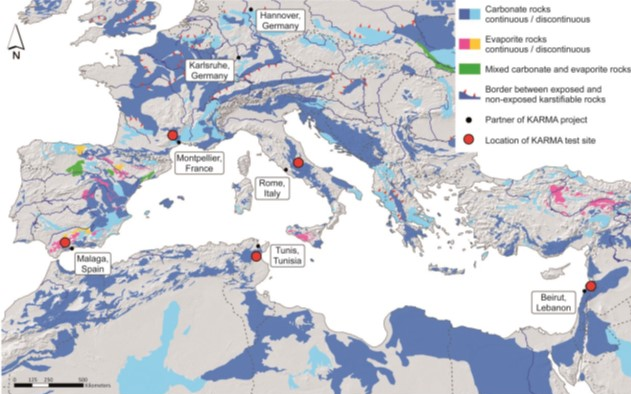KARMA

KARMA - Karst Aquifer Resources availability and quality in the Mediterranean Area
ID Call: PRIMA 2018 - Section 2
Funding Programme: Partnership for Research and Innovation in the Mediterranean Area - PRIMA

Sapienza's role in the project: Beneficiary partner
Scientific supervisor for Sapienza: Marco Petitta
Department: Earth Sciences
Project start date: September 1, 2019
Project end date: February 28, 2023
Project abstact:
Karstified carbonate rocks constitute 21.6 % of the European land surface and contain abundant groundwater resources. These karst aquifers contribute substantially to the freshwater supply of most Mediterranean countries and many large cities, e.g., Rome and Beirut. However, karst aquifers are highly variable in terms of water availability and quality, and vulnerable to contamination and climate change. Therefore, they require specific investigation and management approaches. The main objective of the proposed KARMA project is to achieve substantial progress in the hydrogeological understanding and sustainable management of karst water resources across several scales. Based on our recently accomplished World Karst Aquifer Map, the project will deliver a detailed karst aquifer map at the scale of the entire Mediterranean area with valuable information, noticeably for stakeholders, on recharge, groundwater vulnerability and groundwater-dependent ecosystems. At the catchment scale, five karst systems in Spain, France, Italy, Lebanon and Tunisia will serve as field observatories. Tracer tests, hydrologic monitoring and isotope studies will be applied to better quantify recharge and dynamic water balances. New generic models will allow a better understanding of karst hydrodynamic processes at different spatiotemporal scales and, thus better predictions concerning climatic and human impacts. At the local scale, novel early warning systems for microbial and chemical contamination will be developed based on water-quality monitoring at karst springs. The resulting karst aquifer map will be a major tool for stakeholders and governments in the Mediterranean region's transboundary water resources management.
The new generation of modelling tools proposed in this project will allow better long-term predictions of climate change impacts and improved management decisions. Early warning systems will be helpful to water suppliers in identifying short-term contamination at springs.
The overarching objective of the KARMA project is to achieve substantial progress in the hydrogeological understanding and sustainable management of karst groundwater resources in the Mediterranean area in terms of water availability and quality.

For Italy, the sample area is the Gran Sasso massif in Abruzzo, which is of strategic importance not only because it has the highest altitudes in the Mediterranean but, above all, because of the coexistence of valuable environmental conditions as witnessed by the Gran Sasso and Monti della Laga National Park, associated with anthropic pressure determined by hydropotable water withdrawals and the presence of the Highway Tunnels and the Underground Laboratory of the National Institute of Nuclear Physics, which intercept the regional water table. In the case of the Gran Sasso, it was found that more than 50 per cent of rainfall directly feeds the massif's water table and its sources, while snow cover represents a fundamental element, weighing an average of 20 per cent on groundwater recharge. In the driest years, the aquifer recharge can decrease from about 20 m3/s to about half, but fortunately, the flow rate of the springs is less variable, with guaranteed values of at least 16 m3/s, demonstrating the modulation capacity of the Gran Sasso's enormous rock reservoir. However, the first future forecast scenarios show the possibility of a progressive impact on snow recharge, which could lead to deficits of 15-20% with respect to the currently available resource. While waiting for the final results, the project has already produced an advancement in the state of knowledge on the behaviour of the Mediterranean karst aquifers, which now requires to be adequately transferred to users and the territorial bodies in charge so as to generate concrete actions and develop virtuous management of the water resource, in line with the UN sustainability objectives.
